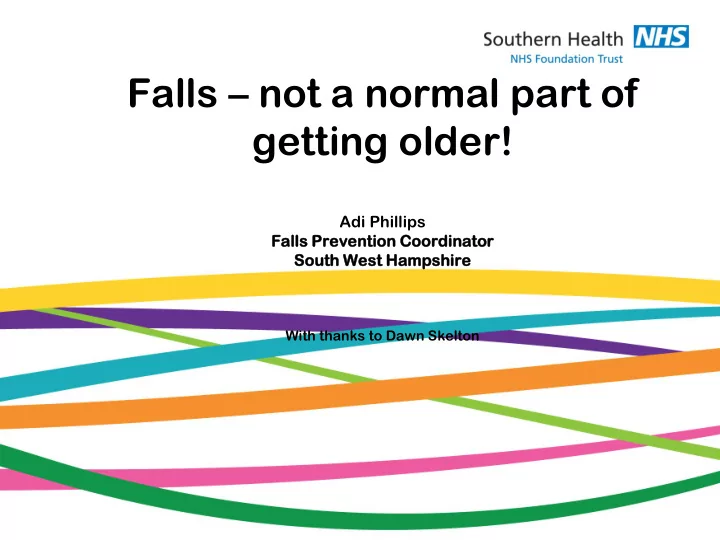

Falls – not a normal part of getting older! Adi Phillips Falls s Preve vent ntion ion Coordin inato ator South th West t Hampsh pshir ire With thanks to Dawn Skelton
Falls in the UK We all fall throughout life The risk increases as we get older Falls are a sign of something going on Injuries can be more serious with age
When do we become “fallers” instead of “trippers”? When our ability to remain upright cannot cope with challenges in our environment Nervous system, reaction times and gait speed slows Balance and strength deteriorates Injuries – fracture site changes
For people with Osteoporosis 95% hip fractures are caused by a fall If you don’t fall, you won’t fracture your hip/wrist
Reasons why people fall: Personal Environmental Vision Indoors Medications Feet & footwear Outdoors Strength & Balance Fear of falling Behavioural Risky behaviour Not taking advice Alcohol
Falls & Vision 98% of people aged 65 and over wear glasses 83% of people living with sight loss are over 60 6 million older people in the UK do not have regular eye tests The rate of falls in older people with visual impairment is 1.7 times higher than those without visual problems
Recommendations Have an eye test every year Separate pairs of distance and reading glasses are recommended – but take care! Beware bifocals/varifocals on stairs/steps Wear sunglasses/hat in bright sunshine Cataract surgery reduces falls Adaptations & advice available from Sensory Impairment team & Open Sight
Medicines As we get older, we may take more medicines Medicines interact with each other We become more sensitive to the effects of medicines
Medicines • Keep an up to date list of your medicines with you and know what they’re for, but don’t stop taking anything without talking to the Doctor • Ask your Doctor to review your medicines annually or book a Medicines Use Review with your Pharmacist • If you notice any unusual feelings with new medicines, tell the Doctor – if a medicine doesn’t suit you there are others! • Ask the Pharmacist before buying over the counter medicines – they may cause a reaction with other medication you’re taking • Alcohol and medicines don’t mix!
Feet & Balance Feet are important in balance Bunions, stiff joints, pain and reduced feeling in feet affect our balance and can lead to a fall Some types of footwear or walking in socks indoors, can also contribute to falls
Happy Feet Wash and dry feet daily Apply moisturiser to keep skin healthy Check feet regularly Cut toe nails regularly (Age Concern nail cutting clinics) Contact GP or Podiatrist if foot pain develops or if you notice reduced sensation
What makes a shoe unsafe? Slip-on shoes eg sling backs or moccasins can slip off and cause a trip Shoes with slippery or worn soles Shoes with heels higher than 1” or with a narrow heel. These make the foot unstable and can cause your ankle to turn
What makes a shoe safe? A firm heel collar to provide stability A low broad heel to maximise contact with the ground A flexible, lightweight, slip- resistant and rubber sole Secure adjustable fastening eg velcro, laces or straps with buckles An anti-slip device reduces falls in icy weather
Feeling dizzy Not a usual symptom Take note of – When does it start? How long does it last? Does it happen when you move?
Falls & ‘giddiness’ Postural hypotension – when blood pressure drops on change of position from lying to sitting or sit to stand Can be due to medication, dehydration, illness Have your Blood Pressure checked by a nurse, medicines reviewed by your GP or pharmacist Don’t rush when getting up Drink plenty of fluids
Hydration Drink a minimum of 8 drinks a day (about 2 litres- unless otherwise advised by Gp – e.g renal failure) Any fluid counts except alcohol Eat water rich fruits such as melon, citrus fruits Eat foods which are high in fluid content such as ice cream, lollies, jellies and nourishing soups
Environmental Causes of Falls Indoors: Outdoors: Clutter Paths & walkways Poor lighting Weather Loose rugs, flooring Public transport Steps/stairs
Is your home safe? Who can help? Occupational Therapy - Health - Social Services Handyman Services Fire Service
Can I get up from the floor? Have a plan If it happens - don’t panic Check over – if injured, call for help… While waiting for help to arrive, keep warm, keep moving. If uninjured, crawl to a solid piece of furniture and pull up on it Rest Tell your Doctor, nurse or carer
A challenge… Studies show that by 12 months, on average only half of community-dwelling older people will listen and put into practice advice from health professionals on ways to reduce their risk of falling. 1. Nyman SR, Victor CR. Age Ageing. 2011;40(4):430-6. 2. Nyman SR, Victor CR. Age Ageing. 2012;41(1):16-23.
So….. Falls are preventable ! Falls are n ot a normal part of getting older What can you do today to reduce your risk of falling? Thank you for listening
Recommend
More recommend